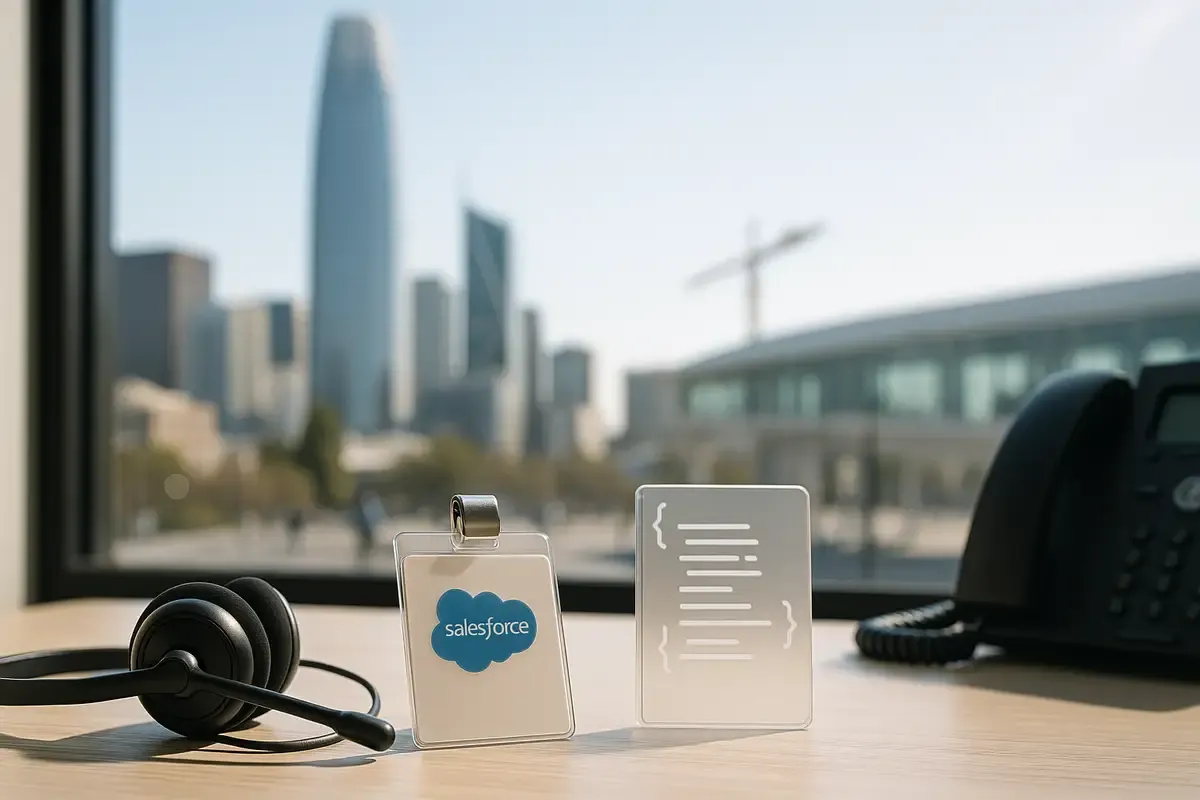Apple Bets It Can Build the Wearable AI Pin That Humane Couldn't
Apple is building an AI wearable pin for 2027, planning 20 million units. Humane sold fewer than 10,000 before HP bought the remains.
Salesforce goes global with AI agents and voice while its stock sits 25% down. The pitch: coordinate everyone's agents through Slack. The problem: fewer than 5% of customers pay for it. Three platforms now fight to be work's front door.

Voice agents, a global Agentforce push, and a $15 billion hometown bet set the stakes.
Salesforce opened Dreamforce with a three-part reveal: Agentforce 360 is now global, voice is built into its agents, and the company is committing a $15 billion plan for San Francisco. The pitch is simple: stop judging Salesforce as an app vendor and start seeing it as the orchestration layer for fleets of AI agents. The problem is also simple: investors aren’t yet buying that story, and the stock is still down roughly a quarter this year.
The shift is architectural, not merely a feature drop. “Agentforce 360” is Salesforce’s attempt to coordinate humans, data, and third-party agents in one governed system, with Slack as the surface where work happens. Beneath the demos is a determinism play: Agent Script, a JSON-style language, lets companies encode exact policies (“follow this refund rule, every time”) while the Atlas Reasoning Engine handles natural-language messiness. It’s an explicit answer to enterprises that want AI help without roulette-wheel answers.
Voice matters because service is still a phone business. Agentforce Voice adds configurable tone, speed, and pronunciation, and it hooks into the phone systems companies already use (Amazon Connect, Genesys, Five9, NICE, and Vonage). Crucially, callers can interrupt the bot mid-sentence—closer to a real call than an IVR maze. Salesforce frames this as table stakes for agentic software, not a parlor trick.
The Breakdown
• Agentforce 360 launches globally with voice calling, but fewer than 5% of 150,000 customers pay for it despite 12,000 implementations
• Salesforce positions Slack as "agentic OS" to coordinate AI agents, competing directly with OpenAI's ChatGPT and ServiceNow's AIx interfaces
• Stock down 25% year-to-date as investors question orchestration pivot before models commoditize both apps and coordination layers
• $15 billion San Francisco investment funds AI incubator and workforce development as company shifts from app vendor to infrastructure play
Salesforce says Agentforce 360 has 12,000 customers today, and it’s weaving the stack through Customer 360 and Slack with enterprise controls. That’s scale, at least on paper.
But the adoption picture is mixed. Fewer than 5% of Salesforce’s 150,000-plus customers pay for Agentforce, according to The Information. That gap—big logos testing agents, far fewer writing checks—explains why shares remain well below January levels even as the broader market rose. Investors want proof that orchestration unlocks budget, not just pilots.
Salesforce also unveiled a political-economy move: spending $15 billion over five years in San Francisco on an AI incubator hub and workforce programs. It’s a civic bet and a demand-generation flywheel. The check lands just as Dreamforce retakes Moscone and the city’s office market claws toward a bottom.
Three incompatible futures are on offer. OpenAI wants ChatGPT to be the work front door. ServiceNow pushes AIx as the conversational pane for IT and beyond. Salesforce says it’s Slack—where agents talk to each other, escalate to humans, and act on governed data. If Slack becomes the “agentic OS,” Salesforce gets to live in the foreground again; if not, it recedes to background plumbing and background margins. Today’s launch plants a big flag on the Slack hill.
ServiceNow and Salesforce are on a collision course: ITSM meets CRM in the middle, with “who orchestrates whose agents” as the real fight. Salesforce is buttressing its case with process intelligence (Apromore) and data plumbing (a pending Informatica deal), arguing that orchestration only works if you control the rules and the context. Customers will care less about whose keynote sizzled and more about which platform gives them predictable agents, usable data, and quick rollback when something goes sideways.
Enterprises can’t ship agents that answer account balances differently on Tuesday than on Monday. Determinism beats cleverness in regulated workflows. But make the system too rigid and it breaks on the first messy sentence from a customer. Salesforce’s hybrid reasoning plus Agent Script is the company’s balance beam. Rivals will claim the same. The scoreboard that matters isn’t “implementations”; it’s paid conversions, month-over-month Slack usage for agentic tasks, and how often customers codify real policies in Agent Script rather than letting probabilistic models freestyle.
Salesforce taught the world SaaS economics over 23 Dreamforces. This year’s act is more precarious: prove that the value migrated from “own the app” to “coordinate the agents” before the models commoditize both.



Get the 5-minute Silicon Valley AI briefing, every weekday morning — free.